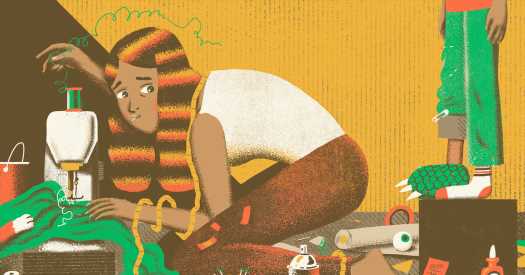
Tomorrow is Halloween or, as I like to call it, preschool Mardi Gras, because it includes costumes, screaming and loud music; and I once saw a 3-year-old vomit spectacularly on the sidewalk while wearing a three-piece suit. It’s not my favorite occasion, in part because I’m a complete washout at creating costumes for my kids.
I used to feel zero guilt about this — my older daughter wore the same hastily-purchased owl costume for three consecutive years, then her sister wore it. I was not swayed or inspired by a million Pinterest promises of “easy Halloween ideas,” or shamed by other moms lovingly displaying their home-sewn Moana costumes on Instagram.
But these days I do feel guilty about not making my 6-year-old an amazing costume … because she’s making me feel guilty about it. Why are her friends’ moms making them costumes, when I bought her vampire get-up on the internet? she asked. I couldn’t answer her in a way she found satisfying.
Deep down, I don’t believe that putting a ton of effort into my kids’ Halloween experience is a good use of my time — I’m not crafty, and anything I might attempt to make would not be up to my older daughter’s exacting standards. The weather is supposed to be miserable in much of the country on Halloween, so even if I did create an acceptable costume, it would be covered by a rain coat.
Still, I can’t shake the feeling that I’m falling short. That’s because guilt coming from your kids “is the most difficult” kind to deal with, said Dr. Pooja Lakshmin, a clinical assistant professor of psychiatry at the George Washington University School of Medicine & Health Sciences. It’s more stealthily devastating than guilt coming from other parents or society at large, Dr. Lakshmin said.
The first thing you can do to manage guilt (costume-related or otherwise) is to acknowledge that it’s perfectly normal to feel bad that your child is disappointed, while also recognizing that complaints from your kid don’t mean you should do anything differently. “Guilt doesn’t have to be a compass,” Dr. Lakshmin said. “It can be just a feeling that you feel. And it sucks,” but it doesn’t have to be a moral judgment on you or your behavior.
What’s more, if I did force myself to make my child a subpar costume, she would probably sense the resentment simmering beneath that poorly-constructed vampire cape. “So much of what kids remember is less about the actual thing you’re doing and more about how they feel when they’re doing it with you,” Dr. Lakshmin said. It’s more important that I’m present with her on Halloween, having fun and eating candy, Dr. Lakshmin explained, because that joyful family time is what she’ll recall a year from now, rather than her disappointment about a store-bought costume.
Finally, it’s important to model good boundaries for your children — in fact, Dr. Lakshmin wrote an excellent piece for us about how saying “no” is self-care for parents. By saying “no” to some things, we’re showing our children that we value our own time and interests, Dr. Lakshmin said. (One thing to note, though: If you have persistent, intense maternal guilt that is so extreme that it’s your primary feeling, it may be time to check in with a mental health professional, as it could be a symptom of postpartum or clinically significant depression or anxiety.)
I’m lucky in that my daughter’s best friend has a very crafty mother, who is willing to take my kid under her wing and teach her how to sew, so that someday she can make her own dang costume. The kicker? Her own daughter has very little interest in crafting. Maybe we should swap.
Want More on Halloween?
Since rain and snow are forecast across the country tomorrow, here are some Halloween crafts and games you can do inside if trick-or-treating is a no-go, and you’re better at crafts than I am. NYT Cooking also has Halloween recipes you can make if you don’t want to leave the house.
Virginia Sole-Smith has a helpful piece about why you shouldn’t stress about your kids eating too much Halloween candy. She talked to pediatricians, psychologists and nutritionists, and the consensus is: “One night of sugar overload will have no lasting negative impact on your children — unless you let your anxieties dominate their experience.”
Jason Zinoman has a rousing and delightful essay on the joys of showing his 7-year-old classic horror movies. “My daughter has seen scores of Disney movies, but the terror of ‘Jaws’ activated her analytical mind in a way that none of them did,” he wrote.
Dr. Aaron E. Carroll, a pediatrician and frequent NYT Parenting contributor, has a great piece about how the real danger on Halloween isn’t poisoned candy — it’s cars.
Tiny Victories
Parenting can be a grind. Let’s celebrate the tiny victories.
Getting my 2-year-old to leave the day care playground is the hardest part of the post-work routine. So I told him that I got an emergency message that Roomba was stuck under the couch and we had to rescue him. It worked! Made me feel so smart.
— Rebecca English, Washington, D.C.
If you want a chance to get your Tiny Victory published, find us on Instagram @NYTparenting and use the hashtag #tinyvictories; email us; or enter your Tiny Victory at the bottom of this page. Include your full name and location. Tiny Victories may be edited for clarity and style. Your name, location and comments may be published, but your contact information will not. By submitting to us, you agree that you have read, understand and accept the Reader Submission Terms in relation to all of the content and other information you send to us.
Source: Read Full Article
